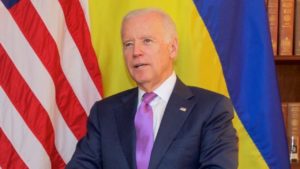
Vice President Joe Biden sits with Ukrainian President Petro Poroshenko on February 7, 2015, before a bilateral meeting also attended by U.S. Secretary of State John Kerry and Assistant Secretary of State for European and Eurasian Affairs Toria Nuland on the sidelines of the Munich Security Conference in Munich, Germany. [State Department photo/ Public Domain]
MK: It is the Russians who should be relinquishing Ukrainian territory if they want peace. And I agree that there is a lot at stake. This is not just about which government controls Kherson but about the future of the rules-based international system and democracy versus autocracy. Speaking of which, U.S. President Joe Biden gave a big (and controversial) speech on the threat to American democracy on Sept. 1.
What is your take?
EA: Ukraine has never rated higher than “partly free” in Freedom House’s annual democracy and civil liberties assessment, so you’ll forgive me for doubting that it is the bulwark of global democracy.
As for Biden’s speech, it was very strange. It was primarily on domestic issues; he actually called out “MAGA Republicans” by name as a major threat to democracy. What did you think?
MK: Well, let me start first with the domestic piece. I thought Biden was justified in wanting to give a speech emphasizing the importance of American democracy and warning of the real threats to it. But the speech quickly veered into a partisan rally, focusing on divisive social issues. It also placed all the blame squarely at the feet of his political opponents while not acknowledging that Democrats have also denied election outcomes and strategically funded the “MAGA Republicans” (the threat to democracy identified by Biden) in primary races so Democrats would face weaker competitors in the general election. So, in short, I was disappointed by the speech.
EA: Yeah, it would have been a much stronger speech—and much more likely to appeal to a broad segment of American voters—if the president had not segued immediately from the genuine threats to democracy at home into a set of topics that are legitimate subjects of political contention, such as abortion.
But this is a foreign-policy column. What about the speech and its relevance to foreign policy? The speech tied neatly into this administration’s framing of foreign policy as a battle between democracies and autocracies. Reading between the lines of Biden’s speech, it seems he is advocating for fighting against autocratic tendencies both at home and abroad.
MK: I think the democracy-versus-autocracy framing basically works as an organizing principle for U.S. foreign policy. The United States and its closest democratic allies in North America (can’t forget Canada!), Europe, and the Indo-Pacific are on one side. Revisionist autocracies—China, Russia, Iran, and North Korea—are on the other. And the dictators are increasingly working together with Russia to buy munitions for its war on Ukraine, from Pyongyang to Tehran.
So, the democracy-versus-autocracy framing is mostly accurate and it is also motivating for America’s democratic allies and partners. Washington and Moscow are not just amoral great powers duking it out. If that were the case, why should anyone care about the outcome? This is a moral competition between good and evil.
If you’re willing to fight for Main Street America, click here to sign up for the Richardcyoung.com free weekly email.





